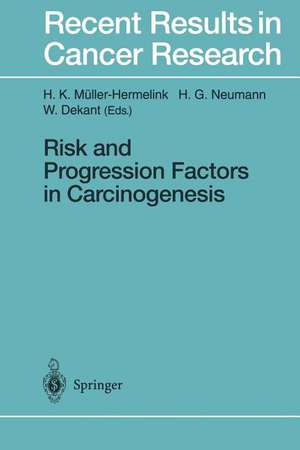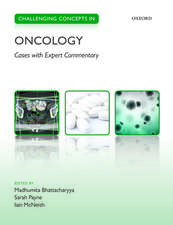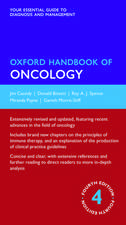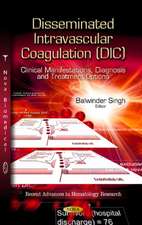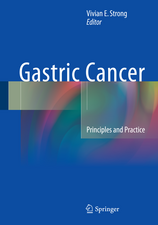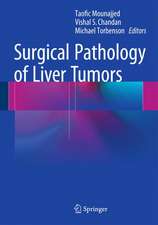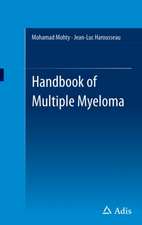Risk and Progression Factors in Carcinogenesis: Recent Results in Cancer Research, cartea 143
Editat de H. K. Müller-Hermelink, H. G. Neumann, W. Dekanten Limba Engleză Paperback – 21 ian 2012
Din seria Recent Results in Cancer Research
- 5%
 Preț: 845.19 lei
Preț: 845.19 lei - 5%
 Preț: 191.69 lei
Preț: 191.69 lei - 5%
 Preț: 782.46 lei
Preț: 782.46 lei - 5%
 Preț: 913.76 lei
Preț: 913.76 lei - 5%
 Preț: 919.23 lei
Preț: 919.23 lei - 5%
 Preț: 400.28 lei
Preț: 400.28 lei - 15%
 Preț: 490.42 lei
Preț: 490.42 lei - 5%
 Preț: 703.83 lei
Preț: 703.83 lei - 5%
 Preț: 721.05 lei
Preț: 721.05 lei - 5%
 Preț: 709.35 lei
Preț: 709.35 lei - 5%
 Preț: 711.15 lei
Preț: 711.15 lei - 5%
 Preț: 710.60 lei
Preț: 710.60 lei - 5%
 Preț: 713.33 lei
Preț: 713.33 lei - 5%
 Preț: 361.80 lei
Preț: 361.80 lei - 5%
 Preț: 712.60 lei
Preț: 712.60 lei - 5%
 Preț: 371.10 lei
Preț: 371.10 lei - 5%
 Preț: 721.96 lei
Preț: 721.96 lei - 5%
 Preț: 716.84 lei
Preț: 716.84 lei - 5%
 Preț: 356.32 lei
Preț: 356.32 lei - 5%
 Preț: 719.74 lei
Preț: 719.74 lei - 5%
 Preț: 717.56 lei
Preț: 717.56 lei - 5%
 Preț: 359.60 lei
Preț: 359.60 lei - 5%
 Preț: 706.41 lei
Preț: 706.41 lei - 5%
 Preț: 717.73 lei
Preț: 717.73 lei - 5%
 Preț: 719.19 lei
Preț: 719.19 lei - 5%
 Preț: 705.32 lei
Preț: 705.32 lei - 5%
 Preț: 718.29 lei
Preț: 718.29 lei - 5%
 Preț: 717.20 lei
Preț: 717.20 lei - 5%
 Preț: 711.15 lei
Preț: 711.15 lei - 5%
 Preț: 712.25 lei
Preț: 712.25 lei - 5%
 Preț: 710.96 lei
Preț: 710.96 lei - 5%
 Preț: 378.97 lei
Preț: 378.97 lei - 5%
 Preț: 1089.68 lei
Preț: 1089.68 lei - 5%
 Preț: 361.06 lei
Preț: 361.06 lei - 5%
 Preț: 712.25 lei
Preț: 712.25 lei - 5%
 Preț: 715.55 lei
Preț: 715.55 lei - 5%
 Preț: 716.84 lei
Preț: 716.84 lei - 5%
 Preț: 720.68 lei
Preț: 720.68 lei - 5%
 Preț: 707.86 lei
Preț: 707.86 lei - 5%
 Preț: 732.01 lei
Preț: 732.01 lei - 5%
 Preț: 715.91 lei
Preț: 715.91 lei - 5%
 Preț: 723.05 lei
Preț: 723.05 lei - 5%
 Preț: 369.10 lei
Preț: 369.10 lei - 5%
 Preț: 709.35 lei
Preț: 709.35 lei - 5%
 Preț: 712.60 lei
Preț: 712.60 lei - 5%
 Preț: 711.52 lei
Preț: 711.52 lei - 5%
 Preț: 719.38 lei
Preț: 719.38 lei - 5%
 Preț: 709.14 lei
Preț: 709.14 lei - 5%
 Preț: 710.06 lei
Preț: 710.06 lei - 5%
 Preț: 724.70 lei
Preț: 724.70 lei
Preț: 722.12 lei
Preț vechi: 760.13 lei
-5% Nou
Puncte Express: 1083
Preț estimativ în valută:
138.17€ • 144.68$ • 114.61£
138.17€ • 144.68$ • 114.61£
Carte tipărită la comandă
Livrare economică 09-23 aprilie
Preluare comenzi: 021 569.72.76
Specificații
ISBN-13: 9783642643859
ISBN-10: 364264385X
Pagini: 412
Ilustrații: XII, 394 p.
Dimensiuni: 155 x 235 x 22 mm
Greutate: 0.58 kg
Ediția:Softcover reprint of the original 1st ed. 1997
Editura: Springer Berlin, Heidelberg
Colecția Springer
Seria Recent Results in Cancer Research
Locul publicării:Berlin, Heidelberg, Germany
ISBN-10: 364264385X
Pagini: 412
Ilustrații: XII, 394 p.
Dimensiuni: 155 x 235 x 22 mm
Greutate: 0.58 kg
Ediția:Softcover reprint of the original 1st ed. 1997
Editura: Springer Berlin, Heidelberg
Colecția Springer
Seria Recent Results in Cancer Research
Locul publicării:Berlin, Heidelberg, Germany
Public țintă
Professional/practitionerCuprins
I. Interaction of Carcinogens with Cellular DNA.- Induction of Frameshift Mutations at Hotspot Sequences by Carcinogen Adducts.- Oxidative DNA Damage Induced by Dioxetanes, Photosensitizing Ketones, and Photo-Fenton Reagents.- Oxidative DNA Damage Profiles in Mammalian Cells.- Chemical Mechanisms of Formation of DNA-Carcinogen Adducts, Elucidation of Potential of Adducts for Mutagenicity, and Mechanisms of Polymerase Fidelity and Mutation in the Presence of Adducts.- Assessment of the Tumor-Initiating Potential of ?,?-Unsaturated Carbonyl Compounds by 32P Postlabeling Quantification of DNA Adducts In Vivo.- Glutathione-Dependent Bioactivation and Renal Toxicity of Xenobiotics.- Ultraviolet-Induced Photolesions: Repair and Mutagenesis.- Psoralen Photobiology: The Relationship Between DNA Damage, Chromatin Structure, Transcription, and Immunogenic Effects.- II. Analysis of Cellular Alterations and Growth Dysregulation in Cancer Cells.- Cellular Stress Response: Stress Proteins — Physiology and Implications for Cancer.- Two-Dimensional Polyacrylamide Gel Electrophoresis of Cancer-Associated Proteins.- Mechanisms Leading to the Expression of Recessive Alleles: The Use of Polymorphic Microsatellites and Whole-Chromosome Painting Probes to Analyze Mouse Tumors, Mtants, and Micronuclei.- Formation of Micronuclei and Inhibition of Topoisomerase II in the Comet Assay in Mammalian Cells with Altered DNA Methylation.- Poly(ADP-Ribosyl)ation and Nuclear Matrix/Intermediate Filament Proteins in Renal Carcinogenesis.- Genotoxic and Chronic Toxic Effects in the Carcinogenicity of Aromatic Amines.- Analysis of Genetic Factors and Molecular Mechanisms in the Development of Hereditary and Carcinogen-Induced Tumors of Xiphophorus.- The Role of Raf Kinases in Development and Growth ofTumors.- Apoptosis Regulation by Raf, Bcl-2, R-Ras.- New Cell Cycle-Regulated Genes in the Yeast Saccharomyces cerevisiae.- The Role of Workhorse Protein Kinases in Coordinating DNA Metabolism and Cell Growth.- III. Selected Findings in Human Tumors.- Growth and Transformation of Human Oral Epithelium In Vitro.- Genetic Lesions in Mantle Cell Lymphoma.- Topoisomerase Activities in Undifferentiated Acute Myeloblastic Leukemias and Monocytic Differentiated Leukemias.- DNA Repair: Genes, Enzymes, Patients, and Mouse Models.- Repair of Directly and Indirectly UV-Induced DNA Lesions and of DNA Double-Strand Breaks in Cells from Skin Cancer-Prone Patients with the Disorders Dysplastic Nevus Syndrome or Basal Cell Nevus Syndrome.- Exploring the Role of Oxygen in Fanconis Anemia.- P53 Gene Alterations in Human Tumors: Perspectives for Cancer Control.
Textul de pe ultima copertă
The principal goal of experimental carcinogenesis is the elucidation of mechanisms and factors that might be of relevance for the formation of human tumors. Specialization, as necessary as it may be, however, may prevent the transfer of knowledge among disciplines involved in cancer research. Leading scientists give insight into mechanisms of carcinogen-induced DNA damage and mutagenicity, and cellular responses including DNA repair, cellular stress, apoptosis, and regulation of cellular growth. Selected human tumor models of oral epithelium, skin cancer, and malignant lymphoma are analyzed in order to determine the most relevant primary genetic alteration in cell-specific transformation. Finally, the epidemiology of p53 mutation is considered as an indication of specific pathogenetic factors in sporadic human tumors.
